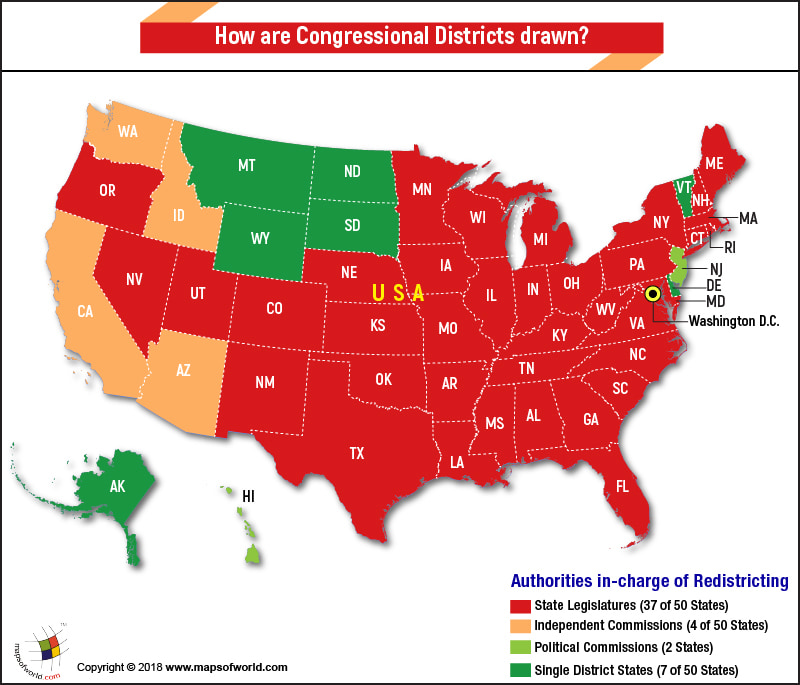

Redistricting is done by State legislatures in 37 states, by Independent commissions in 4 states, by Political commissions in 2 states. Remaining seven states are single district states
The Constitution of the United States authorizes congressional and states legislative districts to be redrawn after each population census, held every ten years. The objective is to give people an equal and fair opportunity to voice their views, issues, and concerns through the person they elect to represent in the US Congress.
Congressional redistricting
As of November 2017, state legislatures hold the responsibility of redistricting congressional districts in 37 of the 43 states.
They include Maine, New Hampshire, Massachusetts, Rhode Island, Connecticut, New York, Pennsylvania, Maryland, Virginia, West Virginia, North Carolina, South Carolina, Ohio, Kentucky, Michigan, Indiana, Tennessee, Georgia, Alabama, Mississippi, Florida, Wisconsin, Illinois, Minnesota, Iowa, Missouri, Arkansas, Louisiana, Nebraska, Kansas, Oklahoma, Texas, Colorado, New Mexico, Utah, Nevada, and Oregon.
Independent commissions hold the responsibility in four states; Washington, Idaho, Arizona, and California.
Political commissions redraw districts in two states; New Jersey and Hawaii.
Remaining seven states are single district states and so, do not require districts to be redrawn. They include Delaware, Vermont, North Dakota, South Dakota, Montana, Wyoming, and Alaska.
State legislative redistricting
The state legislatures hold the responsibility of redistricting in 37 of the 50 states.
Political commissions redraw districts in seven states; New Jersey, Pennsylvania, Ohio, Missouri, Arkansas, Colorado, and Hawaii.
Independent commissions redraw districts in six states; Montana, Idaho, Washington, California, Arizona, and Alaska.
What is a congressional district?
Each state is divided into political districts based on the number of registered people residing there. The objective of drawing up political districts in every state is to give people an equal opportunity to raise local issues and concerns through their elected representative in the House of Representatives. The House has 435 members, each representing one district in the country.
Which state has the most congressional districts?
California has the largest population, and therefore, it has 53 congressional districts, the maximum in the United States.
How does gerrymandering affect redistricting?
Gerrymandering is the practice of redrawing congressional districts to favor one political party or individual over competing political party or individuals. Manipulating of political outcomes through redrawing district lines has been going on since 1812 when the Massachusetts Governor Elbridge Gerry first resorted to this tactic to prevent the Federalists from winning the state senate election that year. Since that year, the practice is referred to as gerrymandering.
It involves two tactics; cracking and packing. Cracking refers to the dilution of rival political party supporter’s voting power while packing refers to consolidating the majority supporters of the opposing party into a single district to reduce the voting power of the majority.
Gerrymandering has also been used to dilute representation in majority areas based on racial, religious, linguistic, and ethnic grounds by packing voters into a single district.
Visit the following to learn more about the USA:
Related Maps:
The Republic of Madagascar is an island country located in the Indian Ocean, off the…
The Euro is the official currency of the European Union. It is, however, not incumbent…
There are many countries or regions that are partially recognized by the UN, have disputes…
The Alaska Statehood Act was signed into law by President Dwight D. Eisenhower in 1958,…
The name Persia may, however, only be used to refer to Iran in some contexts.…
Hawaii is an Island State in the US. It is one of the 50 states…